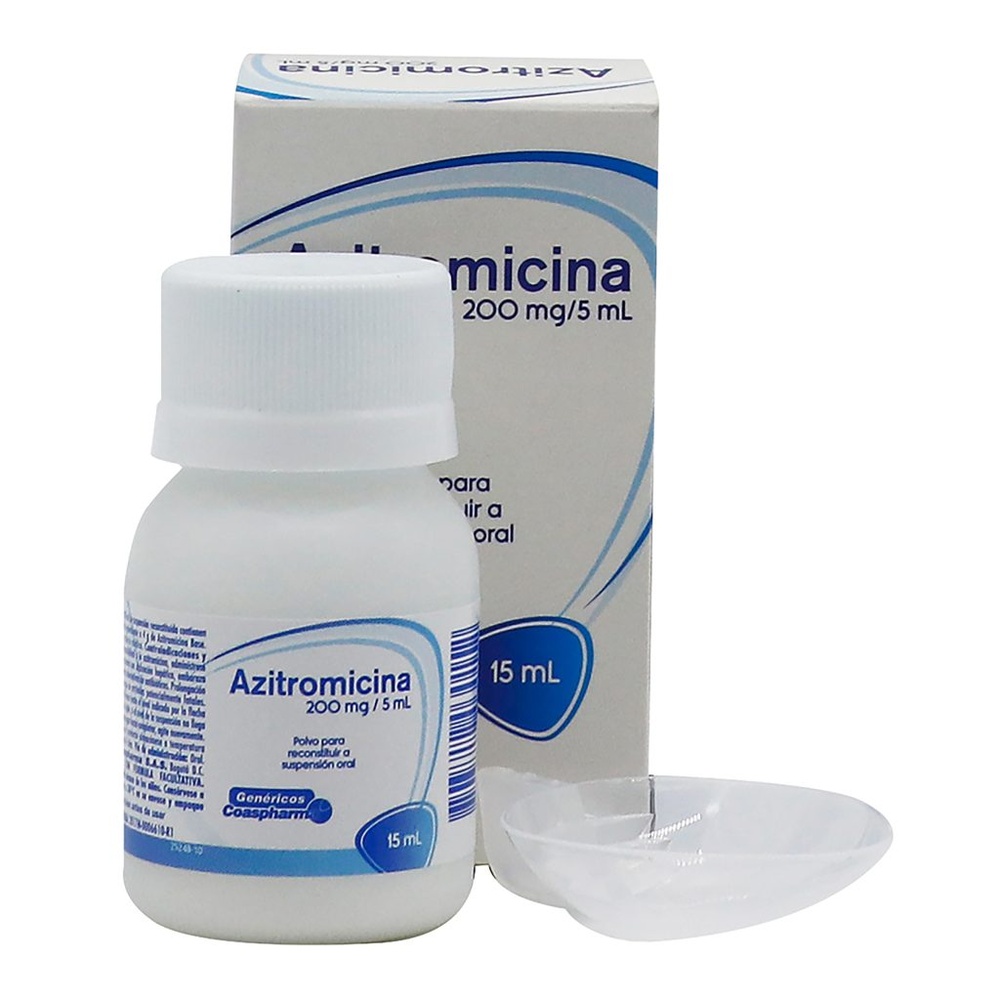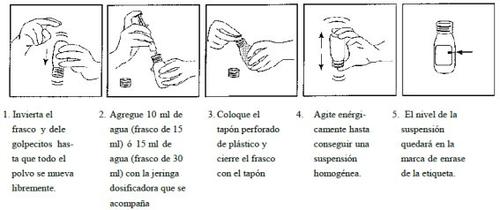

AZITROMICINA QUALIGEN 200 mg/ 5 ml PÓ PARA SUSPENSÃO ORAL

Pergunte a um médico sobre a prescrição de AZITROMICINA QUALIGEN 200 mg/ 5 ml PÓ PARA SUSPENSÃO ORAL

Como usar AZITROMICINA QUALIGEN 200 mg/ 5 ml PÓ PARA SUSPENSÃO ORAL
Introdução
PROSPECTO: INFORMAÇÃO PARA O UTILIZADOR
Azitromicina Qualigen 200 mg/5 ml pó para suspensão oral EFG
Leia todo o prospecto detenidamente antes de começar a tomar este medicamento, porque contém informações importantes para si
- Conserva este prospecto, porque pode ter que voltar a lê-lo.
- Se tiver alguma dúvida, consulte o seu médico ou farmacêutico.
- Este medicamento foi-lhe prescrito apenas para si e não deve dá-lo a outras pessoas, mesmo que tenham os mesmos sintomas, porque pode prejudicá-las.
- Se experimentar efeitos adversos, consulte o seu médico, mesmo que se trate de efeitos adversos que não aparecem neste prospecto. Ver secção 4
Conteúdo do prospecto
- O que é Azitromicina Qualigen e para que é utilizado
- O que precisa saber antes de começar a tomar Azitromicina Qualigen
- Como tomar Azitromicina Qualigen
- Posíveis efeitos adversos
- Conservação de Azitromicina Qualigen
- Conteúdo do envase e informações adicionais
1. O que é Azitromicina Qualigen e para que é utilizado
Azitromicina pertence a um grupo de antibióticos denominados antibióticos macrolídios.
Os antibióticos são utilizados para tratar infecções bacterianas e não servem para tratar infecções virais como a gripe ou o resfriado. É importante que siga as instruções relativas à dose, ao intervalo de administração e à duração do tratamento indicadas pelo seu médico. Não guarde nem reutilize este medicamento. Se uma vez finalizado o tratamento lhe sobrar antibiótico, devolva-o à farmácia para a sua correta eliminação. Não deve deitar os medicamentos pelo esgoto nem para o lixo. |
É utilizado para tratar infecções bacterianas causadas por alguns microorganismos, como as bactérias. Estas infecções são:
- Pioria da bronquite crónica e pneumonia (de gravidade ligeira a moderada).
- Infecções dos seios paranasais, garganta, amígdalas ou ouvidos.
- Infecções ligeiras a moderadas da pele e tecidos moles, por exemplo a infecção dos folículos do cabelo (foliculite), infecção bacteriana da pele e suas camadas mais profundas (celulite), infecção da pele com inchaço e de cor vermelha brilhante (erisipela).
- Infecções produzidas por uma bactéria chamada Chlamydia trachomatis, que podem produzir inflamações do conduto que leva a urina desde a bexiga (uretra) ou do local onde a matriz se une com a vagina (colo do útero).
2. O que precisa saber antes de começar a tomar Azitromicina Qualigen
Não tome Azitromicina Qualigen:
- Se é alérgico à azitromicina, a qualquer um dos outros componentes deste medicamento (incluídos na secção 6) ou a outro antibiótico macrolídeo ou cetólido, por exemplo eritromicina ou telitromicina.
Advertências e precauções
Consulte o seu médico antes de começar a tomar Azitromicina Qualigen se você:
- Já sofreu uma reação alérgica grave com inflamação da face e garganta e com possíveis problemas respiratórios.
- Sofre de problemas de fígado, o seu médico poderá necessitar controlar o funcionamento do seu fígado ou interromper o tratamento.
- Está a tomar medicamentos conhecidos como alcaloides ergóticos (como ergotamina), usados para tratar a enxaqueca: não se recomenda a azitromicina (ver “Uso de Azitromicina Qualigen com outros medicamentos”).
- Sofre de problemas graves de rim, o seu médico poderá modificar a dose.
- Sabe que tem ou lhe diagnosticaram intervalo QT prolongado (uma doença do coração): não se recomenda azitromicina.
- Sabe que tem o pulso lento ou irregular ou a função cardíaca reduzida: não se recomenda azitromicina.
- Sabe que tem níveis baixos de potássio ou magnésio no sangue: não se recomenda a azitromicina
- Está a tomar medicamentos conhecidos como antiarrítmicos (usados para tratar o ritmo cardíaco anormal), cisaprida (usada para o tratamento dos problemas de estômago) ou terfenadina (um antihistamínico usado para tratar alergias): não se recomenda a azitromicina.
- Lhe diagnosticaram alguma doença neurológica, uma doença do cérebro ou do sistema nervoso.
- Tem problemas mentais, emocionais ou de comportamento.
- Se sofre de uma doença chamada miastenia gravis, com fraqueza e fadiga muscular, pois a azitromicina pode contribuir para agravar os sintomas desta doença ou desencadeá-la
Se apresentar diarreia grave e persistente, especialmente com sangue ou muco, durante ou após o tratamento, consulte imediatamente o seu médico.
Se os sintomas persistem uma vez terminado o tratamento com azitromicina ou se nota algum sintoma novo e persistente, comunique-o ao seu médico.
Crianças e adolescentes
Este medicamento não é indicado em crianças menores de 1 ano de idade.
Para o tratamento da sinusite, os dados disponíveis em crianças menores de 16 anos são limitados (ver secção 3).
Uso de Azitromicina Qualigen com outros medicamentos
Informa o seu médico ou farmacêutico se está a tomar, tomou recentemente ou poderá ter que tomar qualquer outro medicamento.
- Antiácidos, por exemplo o hidróxido de alumínio: tome azitromicina pelo menos 1 hora antes ou 2 horas após tomar um antiácido.
- Derivados ergotamínicos, por exemplo a ergotamina, (usado para o tratamento da enxaqueca): Não se deve administrar ao mesmo tempo, pois pode desenvolver-se ergotismo (efeito adverso potencialmente grave com adormecimento ou sensação de formigueiro nas extremidades, cãibras musculares, dores de cabeça, convulsões ou dor abdominal ou de peito.)
- Derivados cumarínicos, por exemplo a warfarina (usada para impedir a coagulação sanguínea): pode aumentar o risco de hemorragias.
- Digoxina (utilizada para tratar insuficiência cardíaca): pode aumentar os níveis de digoxina no sangue.
- Colchicina (utilizada para a gota e a febre mediterrânea familiar)
- Zidovudina, nelfinavir (usados no tratamento do VIH): os níveis de zidovudina ou azitromicina podem aumentar.
- Rifabutina (usada no tratamento do VIH e infecções bacterianas, incluindo a tuberculose): pode ocorrer uma diminuição do número de glóbulos brancos no sangue
- Ciclosporina (um imunossupressor usado após um transplante de órgão): os níveis de ciclosporina podem aumentar. O seu médico necessitará controlar os níveis de ciclosporina no sangue.
- Hidroxicloroquina (para tratar doenças reumáticas ou malária): pode causar problemas cardíacos.
- Cisaprida (usada para tratar problemas de estômago): podem aparecer problemas do coração.
- Astemizol, terfenadina (antihistamínicos usados para tratar reações alérgicas), os seus efeitos podem ser aumentados.
- Alfentanilo (calmante): o efeito do alfentanilo pode aumentar.
- Fluconazol (para infecções por fungos): os níveis de azitromicina podem ser reduzidos
Não se observaram interações entre azitromicina e cetirizina (um antihistamínico); didanosina, efavirenz, indinavir (para infecção por HIV); atorvastatina (para o colesterol e problemas de coração); carbamazepina (para epilepsia), cimetidina (um antiácido); metilprednisolona (para suprimir o sistema imunológico); midazolam, triazolam (sedantes); sildenafilo (para impotência), teofilina (para asma) e trimetoprim/sulfametoxazol (uma combinação antibiótica).
Uso de Azitromicina Qualigen com alimentos e bebidas
A suspensão oral pode ser tomada com ou sem alimento e bebida.
Gravidez, lactação e fertilidade
Se está grávida ou em período de lactação, acredita que possa estar grávida ou tem intenção de engravidar, consulte o seu médico antes de utilizar este medicamento.
Não há informações suficientes sobre o uso de azitromicina durante a gravidez. Por conseguinte, não se recomenda o uso de azitromicina se está grávida, ou deseja engravidar. No entanto, o seu médico pode prescrevê-lo em circunstâncias graves.
Não se recomenda a amamentação enquanto estiver em tratamento com Azitromicina Qualigen, pois pode causar efeitos secundários como diarreia e infecção no bebê. Pode continuar a amamentação dois dias após finalizar o tratamento com Azitromicina Qualigen.
Condução e uso de máquinas
Não existem evidências de que Azitromicina Qualigen tenha efeitos na capacidade de conduzir ou utilizar máquinas
Azitromicina Qualigen contém sacarose e glicose
Este medicamento contém sacarose e glicose. Se o seu médico lhe indicou que padece uma intolerância a certos açúcares, consulte com ele antes de tomar este medicamento.
Os pacientes com diabetes mellitus devem ter em conta que este medicamento contém 3,869 g de sacarose por cada 5 ml de suspensão reconstituída.
Este medicamento contém menos de 23 mg de sódio (1 mmol) por cada 12,5 ml de suspensão reconstituída; isto é, essencialmente “isento de sódio”.
3. Como tomar Azitromicina Qualigen
Siga exatamente as instruções de administração deste medicamento indicadas pelo seu médico. Em caso de dúvida, consulte novamente o seu médico ou farmacêutico
Este medicamento é administrado por via oral. Para facilitar a administração, cada frasco é acompanhado de uma seringa dosificadora.
Este medicamento não é indicado em crianças menores de 1 ano de idade, ver apartado Crianças e adolescentes.
Dose
A suspensão de azitromicina deve ser administrada em uma dose única uma vez ao dia, com ou sem alimentos.
Agite o frasco energicamente antes de usar a suspensão.
Existem outras apresentações disponíveis para os diferentes regimes posológicos. A dose habitual é a seguinte:
Uso em crianças e adolescentes com mais de 45 kg de peso, adultos e pessoas de idade avançada
A dose total de azitromicina é de 37,5ml (1.500 mg) administrados durante 3 dias (12,5 ml (500 mg) uma vez ao dia). Como alternativa, a dose pode ser administrada durante 5 dias (12,5 ml (500 mg) como dose única no primeiro dia e continuar com 6,25 ml (250 mg) uma vez ao dia).
Em inflamações da uretra ou do colo do útero causadas por Chlamydia, a dose é de 25 ml (1.000 mg) em uma dose única.
O tratamento da sinusite só está indicado para adultos e adolescentes maiores de 16 anos de idade.
Existem outras apresentações disponíveis mais adequadas para pacientes com peso superior a 45 kg.
Uso em crianças e adolescentes com menos de 45 kg de peso
O tratamento com azitromicina suspensão deve ser medido cuidadosamente, com ajuda da seringa dosificadora que acompanha, em função do peso da criança, de acordo com o seguinte quadro:
Peso | 3 dias de tratamento | 5 dias de tratamento |
10-15 kg | 0,25 ml/kg (10 mg/kg) uma vez ao dia, do dia 1 ao 3 | 0,25 ml/kg (10 mg/kg) em uma única toma no primeiro dia, seguidos de 0,125 ml (5 mg/kg) uma vez ao dia, do dia 2 ao 5 |
16-25 kg | 5 ml (200 mg) uma vez ao dia, do dia 1 ao 3 | 5 ml (200 mg) em uma única toma no primeiro dia, seguidos de 2,5 ml (100 mg) uma vez ao dia, do dia 2 ao 5 |
26-35 kg | 7,5 ml (300 mg) uma vez ao dia, do dia 1 ao 3 | 7,5 ml (300 mg) em uma única toma no primeiro dia, seguidos de 3,75ml (150 mg) uma vez ao dia, do dia 2 ao 5 |
35-45 kg | 10 ml (400 mg) uma vez ao dia, do dia 1 ao 3 | 10 ml (400 mg) em uma única toma no primeiro dia, seguidos de 5 ml (200 mg) uma vez ao dia, do dia 2 ao 5 |
>45 kg | A mesma dose que para adultos |
Para o tratamento de amigdalite/faringite em crianças de 2 anos de idade ou mais: a dose recomendada de azitromicina é uma dose única de 10 mg/kg ou 20 mg/kg durante 3 dias, na qual não se deve exceder uma dose diária máxima de 500 mg.
Sinusite
Para o tratamento da sinusite, os dados disponíveis em crianças menores de 16 anos são limitados.
Pacientes com problemas de fígado ou rim:
Deve informar o seu médico se tem problemas de fígado ou rim, pois pode ter que modificar a dose normal.
Preparação da suspensão
- Preparação da suspensão

Cada 5 ml de suspensão reconstituída conterão 200 mg de Azitromicina.
A suspensão oral, reconstituída pode ser mantida a temperatura ambiente durante um período de 10 dias; transcorrido este tempo, deve descartar a solução sobrante.
O pó para suspensão pode ultrapassar a marca de nível no frasco, isto se deve à densidade específica do preparado.
- Administração da dose

A seringa dosificadora também está graduada para poder administrar a dose de acordo com o peso da criança.
Uma vez preparada a seringa, administre imediatamente.
ADVERTÊNCIA: ADMINISTRE LENTAMENTE O MEDICAMENTO À CRIANÇA E CERTIFIQUE-SE DE QUE ESTÁ INCORPORADO. DESTA MANEIRA EVITARÁ O RISCO DE ASFIXIA.
Se você tomar mais Azitromicina Qualigen do que deve
Se você (ou alguém) tomar mais azitromicina do que deve, comunique-o imediatamente ao seu médico ou farmacêutico. É provável que uma sobredose provoque uma perda temporária de audição, náuseas intensas, vômitos e diarreia.
Em caso de sobredose ou ingestão acidental, consulte imediatamente o seu médico ou farmacêutico ou ligue para o Serviço de Informação Toxicológica, telefone: 91 562 04 20.
Se esquecer de tomar Azitromicina Qualigen
Não tome uma dose dupla para compensar as doses esquecidas.
Se interromper o tratamento com Azitromicina Qualigen
Não deixe de tomar o seu medicamento sem consultar antes o seu médico, embora se sinta melhor. É muito importante que siga tomando Azitromicina Qualigen durante o tempo que lhe tenha sido indicado pelo seu médico, se não, a infecção poderá reaparecer.
Se tiver alguma outra dúvida sobre o uso deste produto, pergunte ao seu médico ou farmacêutico.
4. Possíveis efeitos adversos
Tal como todos os medicamentos, este medicamento pode produzir efeitos adversos, embora nem todas as pessoas os sofram.
Se experimentar algo do seguinte, deixe de tomar os comprimidos e acuda ao seu médico imediatamente ou às urgências do hospital mais próximo.
- reação alérgica (inchaço dos lábios, face ou pescoço, que produz dificuldade grave na respiração; erupção ou sarpullido na pele).
- bolhas/sangramento de lábios, olhos, nariz, boca e genitais, o que pode ser provocado pelo síndrome de Stevens-Johnson, eritema multiforme ou por necrose epidérmica tóxica, as quais são doenças graves.
- pulso cardíaco irregular
- diarreia prolongada com sangue e muco.
Estes são efeitos adversos graves, mas raros. Pode necessitar de atenção médica urgente ou hospitalização.
Foram notificados outros efeitos adversos descritos a seguir:
Muito frequentes (pode afetar mais de 1 de cada 10 pessoas):
- Diarréia
Frequentes (pode afetar até 1 de cada 10 pessoas)
- Alteração do número de alguns tipos de glóbulos brancos e bicarbonato no sangue
- Dor de cabeça
- Vômitos, dor de estômago, náuseas
Pouco frequentes (pode afetar até 1 de cada 100 pessoas)
- Infecção por fungos, por exemplo, na boca (aftas), infecção da vagina, pneumonia, infecção bacteriana
- Dor de garganta, inflamação do revestimento do estômago e intestino
- Falta de respiração, dor no peito, respiração sibilante e tosse (distúrbios da respiração), nariz congestionado
- Distúrbios da sangue caracterizados por febre ou calafrios, dor de garganta, úlceras na boca ou garganta
- Reações alérgicas
- Perda de apetite
- Nervosismo
- Tonturas, sonolência, alterações do gosto, formigamento ou entorpecimento
- Distúrbios da visão
- Problemas de audição
- Vértigo (sensação de giros)
- Anormalidade no ritmo ou frequência do coração e detecção do latido do coração (palpitações)
- Sofocos
- Dificuldade na respiração
- Hemorragia no nariz
- Inflamação do estômago, prisão de ventre, dificuldade para engolir, sensação de estar inchado, secura da boca
- Arrotos, úlceras na boca, aumento da salivação, fezes moles
- Hepatite (inflamação do fígado)
- Erupção na pele, coceira, urticária (erupção com coceira)
- Inflamação da pele, secura da pele, aumento da sudorese
- Inflamação das articulações, dor muscular, dor nas costas, dor no pescoço
- Dificuldade para urinar
- Inflamação da vagina, hemorragia menstrual irregular, distúrbio testicular
- Dor no peito, inchaço, mal-estar, fraqueza, cansaço, inflamação da face, febre, dor
- Mudanças nos enzimas do fígado e valores analíticos no sangue
Raros (podem afetar até 1 de cada 1.000 pessoas)
- Agitação
- Sentimento de que as coisas são irreais
- Confusão, especialmente em pacientes de idade avançada
- Descoloração dos dentes
- Funcionamento anormal do fígado, icterícia (pigmentação amarelada da pele)
- Reações alérgicas, incluindo edema angioneurótico
- Vermelhidão e formação de bolhas na pele ao se expor à luz do sol
- Reações cutâneas graves: erupção cutânea que se caracteriza pela rápida aparição de zonas de pele vermelha salpicadas de pequenas pústulas (pequenas bolhas cheias de líquido branco/amarelado)
Não conhecido (a frequência não pode ser estimada a partir dos dados disponíveis):
- Distúrbios da sangue caracterizados por hemorragias pouco comuns ou hematomas, diminuição do recuento sanguíneo causando fraqueza ou cansaço pouco comum
- Agressão, ansiedade, confusão, ver ou ouvir coisas que não são reais
- Desmaio, convulsões, diminuição da sensibilidade, hiperatividade, alteração ou perda do sentido do olfato, alteração ou perda do sentido do gosto, miastenia gravis (fraqueza e fadiga muscular, ver “Advertências e precauções” anteriormente)
- Alteração na audição, incluindo surdez e/ou zumbidos nos ouvidos
- Mudança na frequência do coração, mudanças do ritmo do coração detectado em eletrocardiograma (prolongação do intervalo QT e torsade de pointes)
- Diminuição da pressão sanguínea (a qual pode associar-se com fraqueza, tontura e desmaio)
- Descoloração da língua, inflamação do pâncreas que produz náuseas, vômitos, dor abdominal, dor nas costas
- Insuficiência hepática (raramente mortal)
- Erupção cutânea com manchas e bolhas
- Problemas nos rins
- Inflamação grave do intestino (colite pseudomembranosa)
- Reação alérgica grave que pode provocar choque (reação anafiláctica)
Foram notificados os seguintes efeitos adversos em pacientes em tratamento com azitromicina para a prevenção de infecções por Complexo Mycobacterium Avium (MAC):
Muito frequentes (pode afetar mais de 1 de cada 10 pessoas):
- Diarréia
- Dor abdominal
- Náuseas
- Gases (flatulência)
- Mal-estar abdominal
- Fezes moles
Frequentes (pode afetar até 1 de cada 10 pessoas)
- Falta de apetite (anorexia)
- Sensação de tontura (tonturas)
- Dor de cabeça
- Sensação de formigamento ou entorpecimento (parestesia)
- Mudanças no gosto (disgeusia)
- Diminuição visual
- Surdez
- Erupção na pele
- Coceira (prurito)
- Dor nas articulações (artralgia)
- Cansaço
Pouco frequentes (pode afetar até 1 de cada 100 pessoas)
- Redução da sensibilidade (hipoestesia)
- Perda da audição ou zumbido nos ouvidos
- Anormalidade no ritmo ou frequência do coração e detecção do latido do coração (palpitações)
- Problemas de fígado, tais como hepatite
- -Bolhas/sangramento dos lábios, olhos, nariz, boca e genitais, que pode ser produzido pelo síndrome de Stevens-Johnson
- Reações alérgicas da pele, como sensibilidade à luz do sol, pele vermelha, descamada e inflamada
- Fraqueza (astenia)
- Sensação de mal-estar geral
Comunicação de efeitos adversos
Se experimentar qualquer tipo de efeito adverso, consulte o seu médico, mesmo que se trate de possíveis efeitos adversos que não aparecem neste prospecto. Também pode comunicá-los diretamente através do sistema espanhol de Farmacovigilância de Medicamentos de Uso Humano Website: www.notificaram.es. Mediante a comunicação de efeitos adversos, você pode contribuir para proporcionar mais informações sobre a segurança deste medicamento.
5. Conservação de Azitromicina Qualigen
Frascos fechados: Não requer condições especiais de conservação. Conservar no embalagem original.
Solução reconstituída: 10 dias. Anote no recuadro que há para tal fim, tanto na caixa como na etiqueta do frasco, o dia e o mês da reconstituição da suspensão. Não tome o medicamento após 10 dias da sua reconstituição; descarte a solução sobrante.
Mantenha este medicamento fora da vista e do alcance das crianças.
Não utilize Azitromicina Qualigen após a data de caducidade indicada no envase após CAD.
A data de caducidade é o último dia do mês que se indica.
Os medicamentos não devem ser jogados nos deságues nem na lixeira. Deposite os envases e os medicamentos que não precisa no Ponto SIGRE da farmácia. Em caso de dúvida, pergunte ao seu farmacêutico como se livrar dos envases e dos medicamentos que não precisa. Dessa forma, você ajudará a proteger o meio ambiente.
6. Conteúdo do envase e informações adicionais
Composição de Azitromicina Qualigen 200 mg / 5 ml pó para suspensão oral
- O princípio ativo é azitromicina (como diidrato). Cada 5 ml de suspensão reconstituída contém 200 mg de azitromicina (como diidrato). Cada ml de suspensão reconstituída contém 40 mg de azitromicina (como diidrato).
- Os demais componentes (excipientes) são: Sacarose, fosfato trissódico anidro, hidroxipropilcelulose, goma xantana, aroma banana (contém glicose e amido de milho), aroma morango (contém glicose e amido de milho).
Aspecto do produto e conteúdo do envase
Este medicamento é um pó para suspensão oral, quase branco de odor a banana-morango. Está envasado em frascos de vidro âmbar tipo III, fechado com uma cápsula de polietileno com disco obturador de polietileno.
Cada caixa de cartão contém um frasco de 15 ml ou 30 ml.
É incluída uma seringa dosificadora de polipropileno/polietileno com obturador de polietileno.
Titular da autorização de comercialização e responsável pela fabricação
Titular da autorização de comercialização
Neuraxpharm Spain, S.L.U.
Avda. Barcelona, 69
08970 Sant Joan Despí
Barcelona – Espanha
Responsável pela fabricação
Neuraxpharm Pharmaceuticals, S.L.
Avda. de Barcelona, 69
08970 Sant Joan Despí – Barcelona
Espanha
Este prospecto foi aprovado em Abril 2023
A informação detalhada e atualizada deste medicamento está disponível na página Web da Agência Espanhola de Medicamentos e Produtos Sanitários (AEMPS) http://www.gob.aemps

Quanto custa o AZITROMICINA QUALIGEN 200 mg/ 5 ml PÓ PARA SUSPENSÃO ORAL em Espanha em 2025?
O preço médio do AZITROMICINA QUALIGEN 200 mg/ 5 ml PÓ PARA SUSPENSÃO ORAL em novembro de 2025 é de cerca de 3.01 EUR. Os valores podem variar consoante a região, a farmácia e a necessidade de receita. Confirme sempre com uma farmácia local ou fonte online para obter informações atualizadas.
- País de registo
- Preço médio em farmácia3.01 EUR
- Substância ativa
- Requer receita médicaSim
- Fabricante
- Esta informação é apenas para referência e não constitui aconselhamento médico. Consulte sempre um médico antes de tomar qualquer medicamento. A Oladoctor não se responsabiliza por decisões médicas baseadas neste conteúdo.
- Alternativas a AZITROMICINA QUALIGEN 200 mg/ 5 ml PÓ PARA SUSPENSÃO ORALForma farmacêutica: SOLUÇÃO/SUSPENSÃO ORAL, 200 mg de azitromicina / 5 mlSubstância ativa: azithromycinFabricante: Arafarma Group S.A.Requer receita médicaForma farmacêutica: COMPRIMIDO, 500 mgSubstância ativa: azithromycinFabricante: Arafarma Group S.A.Requer receita médicaForma farmacêutica: SOLUÇÃO/SUSPENSÃO ORAL, 500 mgSubstância ativa: azithromycinFabricante: Arafarma Group S.A.Requer receita médica
Alternativas a AZITROMICINA QUALIGEN 200 mg/ 5 ml PÓ PARA SUSPENSÃO ORAL noutros países
As melhores alternativas com o mesmo princípio ativo e efeito terapêutico.
Alternativa a AZITROMICINA QUALIGEN 200 mg/ 5 ml PÓ PARA SUSPENSÃO ORAL em Polónia
Alternativa a AZITROMICINA QUALIGEN 200 mg/ 5 ml PÓ PARA SUSPENSÃO ORAL em Ukraine
Médicos online para AZITROMICINA QUALIGEN 200 mg/ 5 ml PÓ PARA SUSPENSÃO ORAL
Avaliação de posologia, efeitos secundários, interações, contraindicações e renovação da receita de AZITROMICINA QUALIGEN 200 mg/ 5 ml PÓ PARA SUSPENSÃO ORAL – sujeita a avaliação médica e regras locais.















